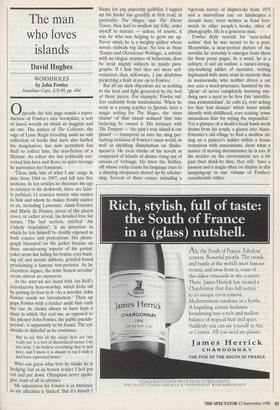The man who loves islands
David Hughes
WORMHOLES by John Fowles Jonathan Cape, 118.99, pp. 404 Opposite the title page stands a repro- duction of Fowles's nice bookplate, a sort of laurel wreath on which sit magpies and an owl. The author of The Collector, the sage of Lyme Regis brooding amid an odd collection of books that have also fuelled his imagination, has now permitted Jan Reif to collect him: the non-fiction of a lifetime. As editor she has politically cor- rected him here and there; in quiet revenge he patronises her feminism.
'These little bits of what I am' range in date from 1964 to 1997, and fall into five sections. In ten articles he discusses his ego in relation to his deskwork; three are faint- ly political; 11 concern writers who matter to him and whom he makes freshly matter to us, including Lawrence, Alain-Fournier and Marie de France; seven of the pieces cover, or rather reveal, his detailed love for nature. The last section, entitled 'An Unholy Inquisition', is an interview in which he lets himself be doubly exposed as both evasive and pretentious. His photo- graph blazoned on the jacket focuses on these unendearing 'aspects of his genius: yokel straw hat hiding his brains, eyes back- ing off and mouth dubious, grizzled beard proclaiming a famous non-persona. As he elsewhere argues, the term 'honest novelist' seems almost an oxymoron.
At the start we are faced with Jan Relfs introductory hero-worship, which kicks off by putting its foot in it: 'As a novelist, John Fowles needs no introduction.' Then up pops Fowles with a further aside that curls the toe: he claims always to have kept a diary in which 'the real me, as opposed to the phoney John Fowles, the public pseudo- person', is apparently to.be found. The eye shrinks in disbelief as he continues,
But to say that all the essays here are 'not really me' is a sort of shamefaced excuse I do not seek. I do believe everything that is said here, and I know it is absurd to say I wish it had been expressed better.'
Who can guess what bets he thinks he is hedging, but as an honest reader I feel put out and put down. Olympians never apolo- gise, least of all in advance.
My admiration for Fowles is as immense as my affection is limited. But it's myself I blame for any unworthy quibbles. I lapped up his books too greedily at first read, in particular The Magus and The Ebony Tower, then had to swallow my folly, order myself to mature — unless, of course, it was he who was helping to grow me up. Never mind, he is a weighty author whose novels embody big ideas. No less in these 'Essays and Occasional Writings', a subtitle with an elegiac murmur of belletrism, does he treat mighty subjects in meaty para- graphs. If I hint that they are more self- conscious than self-aware, I am doubtless projecting a fault in me on to Fowles.
But all my dark objections are as nothing to the heat and light generated by the best of these pieces. For example, Fowles suf- fers radiantly from insulomania. When he went as a young teacher to Spetsai, later a magic setting for The Magus, the 'siren charm' of that island seduced him into believing he owned it. His intimacy with The Tempest — 'the play's true island is our planet' — transports us into the snug per- turbing isolation of Fowles's inner world, as well as shedding illumination on Shake- speare's. He even thinks of his novels as composed of islands of drama rising out of oceans of verbiage. He loves the Scillies, off whose rocky coasts his language rises to a dizzying eloquence shored up by scholar- ship. Several of these essays, including a vigorous survey of shipwrecks from 1975 and a marvellous one on landscapes a decade later, were written as fond fore- words to other people's books, often of photographs. He is a generous man.
Fowles dryly records his 'near-lethal notion' that he was meant to be a poet. Meanwhile, a near-perfect picture of the novelist he certainly is emerges from these far from prosy pages. In a word, he is a solitary, if not an outlaw, a nature-loving, city-loathing addict of narrative, writing haphazard with more trust in memory than in memoranda, who neither drives a car nor uses a word-processor, haunted by the 'ghost' of never completely knowing any- thing save a need to be free (his 'antedilu- vian existentialism', he calls it), ever aching for that 'lost domain' which lesser minds identify with childhood, ever seeking 'some miraculous flair for saying the impossible'. Yet a glimpse of a death's-head hawk moth drawn from his youth, a glance into Alain- Fournier's old village to find a swallow sit- ting on a painter's ladder within a house tremulous with associations, show what a master of moving documentary he is too. If his articles on the environment are a bit past their think-by date, they still 'have a passion and a magic often on display in this snapping-up in one volume of Fowles's considerable trifles.


































































 Previous page
Previous page